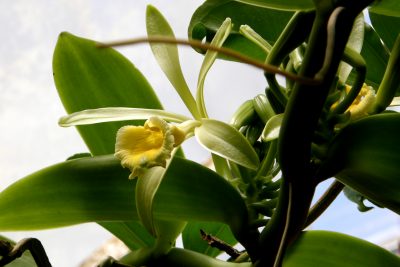 If you’ve ever prepared a batch of chocolate chip cookies or a classic crème brûlée, you know that vanilla extract or beans are must-have ingredients. You probably have some in your pantry at home right now. But have you ever thought about how that baking staple makes it into your kitchen?
If you’ve ever prepared a batch of chocolate chip cookies or a classic crème brûlée, you know that vanilla extract or beans are must-have ingredients. You probably have some in your pantry at home right now. But have you ever thought about how that baking staple makes it into your kitchen?
Vanilla is an orchid, and it’s the only genus of the plant that produces a crop commodity. Vanilla production and export mainly take place in just a handful of countries—Madagascar is one well-known by foodies—and that production is currently in a vulnerable state. That’s why the Crop Trust, an international organization focused on crop diversity, set out to create a global strategy for the conservation and use of Vanilla genetic resources.
Put simply, the genetic uniformity of cultivated Vanilla has resulted in significant risks to global production. A system to diversify that genetic base could make Vanilla plants more resilient and boost their quality and production. Selby Gardens scientists were invited by the Crop Trust to be a vital part of the team creating that game plan, because of their expertise with tropical orchids and the size of Selby Gardens’ living Vanilla collection.
Vanilla vulnerabilities
According to the Crop Trust report, the main species cultivated to produce vanilla are Vanilla planifolia Andrews, V. x tahitensis J.W. Moore, and V. pompona Scheide. Vanilla production is a source of income for small farmers and an important part of the economies of the countries where it’s grown for export. But in the face of growing global demand for vanilla, inefficiencies in production and market systems and the genetic uniformity of the cultivated species are cause for concern.
“As with any crop or any biological species, genetic uniformity leads to extreme vulnerability to pests or disease,” says Shawn McCourt, PhD, plant records keeper in the Botany department at Selby Gardens. “Once a pathogen overrides natural immunity in one individual, it can do so in all genetically identical individuals without further resistance.”
The Crop Trust report lays out strategies to improve the current global system for the conservation and use of Vanilla genetic resources that include a global initiative to secure the long-term conservation of Vanilla genetic resources in farmers’ fields, protected areas, and collections like the one at Selby Gardens.
“Without new combinations of genes from wild plants of the same species, or even from other wild Vanilla species, the crop may become locked into a set of genes that eventually offer little in the way of resistance to pests, disease, or changing environmental conditions,” says McCourt. “Fungal pathogens already pose a severe threat to the global crop, and a single infection can wipe out an entire Vanilla plantation in a matter of weeks. Vulnerability to pathogens leads to increased reliance on expensive pesticides and lower yields for the farmer, translating into soaring prices for the consumer.”
A ‘botanical Noah’s Ark’
That’s where a resource like Selby Gardens and its ex situ Vanilla collection comes in. (Ex situ collections are conservation collections of plants or animals kept in locations outside of their natural habitats.) “From these collections, mass propagation and future reintroduction into the wild becomes a possibility, if sufficient habitat exists,” says McCourt.
He points to something like Vanilla dilloniana, which has disappeared from the wild in Florida but remains widely distributed (though vulnerable) throughout the West Indies. Using conserved genetic materials of Vanilla dilloniana from private or public collections, “the species could potentially be restored to the wild in Florida, even though its original habitat has been paved over with concrete and steel,” says McCourt.
Increasing genetic diversity could lead to better yields of Vanilla beans or even a better-quality crop. “Wild Vanilla plants may even harbor genes for other unique compounds that could potentially improve or even surpass the flavors or aromatic profiles of those varieties currently on the market,” says McCourt.
Participating in these efforts to develop the Crop Trust’s global strategy for Vanilla conservation ties into one of the key pillars of Selby Gardens’ Strategic Plan—strategically stewarding and expanding our collections to inform worldwide conservation efforts.
“Ex situ collections held at botanical gardens, arboreta, and seed banks can each be thought of as a ‘botanical Noah’s Ark,’” says McCourt. “Without them, many species and landraces would already be lost forever. They offer the hope of a time of recovery and a wealth of plant genetic resources to sustain life on Earth, and humanity along with it, far into the future.”
